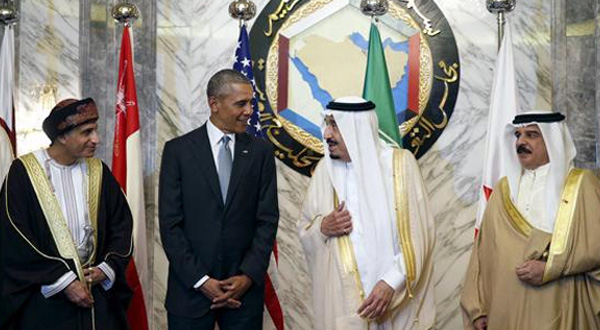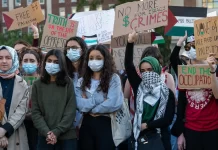RIYADH: The six-nation Gulf Cooperation Council (GCC) and the United States reiterated support for the Joint Comprehensive Plan of Action on Iran and aimed to remain vigilant about Iran’s destabilizing actions in the Gulf region, including its ballistic missile program, and support for terrorist groups such as Hezbollah and extremist proxies in Syria, Yemen and Lebanon, Arab News reported.
Both sides, in a joint declaration of the 2nd GCC-US summit, pledged to increase cooperation for resolving regional conflicts, information sharing on Iran, marine security and implement an integrated ballistic missile defense and early warning system.
GCC officials and U.S. expressed solidarity with the Syrian people and emphasised the importance of the full implementation of UN Security Council Resolution 2254, to include immediate humanitarian access to besieged and hard-to-reach areas and the release of any arbitrarily detained persons.
They reaffirmed the need for a political transition without Bashar Assad that preserves state institutions and sustains renewed focus on the fight against Daesh.
They also expressed concern for the plight of refugees and internally displaced people and welcomed plans by the US to convene a high-level Summit on Refugees in September 2016. Ahead of that summit, they underscored the need to provide additional assistance for refugees.
The leaders said that they wanted to see the conflict in Iraq resolved with inclusive governance and reconciliation among all Iraqis including by urgently addressing the legitimate grievances of all components of Iraqi society through reforms.
They further pledged to intensify support for Iraqi measures to defeat Daesh and called for intensified efforts to stabilize territory liberated and deliver additional aid to Iraq’s refugees.
The leaders welcomed the cessation of hostilities in Yemen, pledged to support it and urged all Yemeni parties to also abide by it. They expressed continued support for UN special envoy Ismail Ould Cheikh Ahmed’s work and emphasized the importance of achieving progress in talks convening in Kuwait, to achieve a political solution according to United Nations resolution 2216 (2015) and the GCC initiative.
The GCC countries and the US also underscored the need to resolve the Israeli-Palestinian conflict based on a just, lasting, comprehensive peace agreement that results in a sovereign and contiguous Palestinian state living side-by-side in peace and security with Israel.
While reviewing the substantial progress made since the first GCC-US summit in May 2015 at Camp David, the leaders, recognizing the region’s challenges, also committed to urgently undertake additional steps and intensify the campaign to defeat Daesh and de-escalate and resolve regional conflicts.
To build on this progress, the leaders reaffirmed support for the common principles decided at Camp David including a shared recognition that there is no military solution to the region’s armed civil conflicts, which can only be resolved through political means, respect for all states’ sovereignty and non-interference in their internal affairs.
The summit underscored the importance of strengthening the GCC capacity to address external and internal threats noting the US policy to use all elements of its power to secure its core interests in the Gulf region and to deter and confront external aggression against its allies and partners, as it did during the Gulf War.
The leaders were briefed on GCC-US training exercises, announcing the two sides would immediately begin planning for a combined military exercise in March 2017 to showcase the full range of GCC-US security capabilities.
GCC countries endorsed quick implementation of a new initiative to train specially designated Special Operations Forces (SOF) units from each GCC country in order to bolster inter-operable counter terrorism capabilities.
Moreover, the US expressed its readiness to support GCC efforts to diversify their economies, provide more effective governance and adapt to economic challenges posed by low oil prices and changing demographics.
To that end, GCC countries endorsed a US proposal to inaugurate a ministerial-level GCC-US economic dialogue this year, to supplement the activities undertaken under the GCC-US framework agreement on economic, trade, investment and technical cooperation of 2012.
The GCC-US leaders also committed to continue coordinating closely on issues of mutual concern including through meetings of GCC and US foreign and defense ministers and support for an annual leader-level summit.
(Image Courtesy: Arab News)






